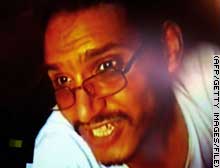  Abu Hamza al-Muhajer
Abu Hamza al-MuhajerAbu Ayyub al-Masri |  |
|
معلومات عن المناضل ، ووصلات لمواقع إخبارية بخصوص أفغانستا | |
of Al-Qaeda Leader in Iraq Daily Star, Lebanon, © Assyrian International News Agency, May 3, 2007 An Islamist lawyer and Egyptian security officials said for the first time Wednesday that they knew the real identity of the leader of Al-Qaeda in Iraq, as skepticism grew over claims that he had been killed. Iraq's government and its tribal allies were scouring insurgent territory Wednesday for proof that Abu Ayyoub al-Masri - also known as Abu Hamza al-Mouhajer - had been killed in clashes between armed factions. An insurgent coalition insisted in a Web posting he was alive but offered no proof. Brigadier General Abdel Karim Khalaf, the Interior Ministry's operations director, admitted Iraq has still not found any body or human remains to back up reports of Masri's death. "So far we don't have it, but there are efforts under way to look for the body," said Khalaf, whose claim 24 hours earlier that Masri had been killed was treated with caution by the US. In Cairo, Islamist lawyer Montasser al-Zayyat said Masri was in fact Abdel-Monem Izzeddine Ali Ismail, an Egyptian bomb expert and a former member of the Islamic Jihad group headed by Osama bin Laden's deputy Ayman al-Zawahri. The lawyer, himself a former member of the Egyptian militant Gamaa Islamiyya group, said that Masri has used several other pseudonyms in the past, including Abu Ayyoub, Abu Jihad, Youssef Haddad, and Labib Haddad. Zayyat cited official papers and court documents which said that Ismail was born on December 21, 1969, in Nile Delta Province of Al-Sharqiyya and left school there before he joined the Islamic Jihad group. In 1999, Ismail was sentenced for seven years in absentia for terrorist activities, Zayyat told The Associated Press. Egyptian security officials confirmed Zayyat's identification of Masri, and said he has been investigated for links with Egyptian activists recruiting volunteers to fight in Iraq. Masri, an Egyptian militant, took over leadership of Al-Qaeda and was endorsed by bin Laden after A coalition of Sunni tribes that has vowed to defeat Al-Qaeda has claimed responsibility for Masri's alleged death, saying they tracked him to an area just north of Baghdad and killed him in a dawn ambush on Tuesday. "We have evidence and eyewitnesses and our contacts with the tribes there all confirm the killing," said Hamid al-Hayis, head of the Anbar Salvation Council, the armed wing of the Anbar Awakening, an alliance of tribal sheikhs. Hayis said finding proof of the deaths of Masri and a small group of fellow Al-Qaeda militants was proving difficult, because the orchards and villages of the Nibae area near Taji are still in the hands of insurgents. "The area is still under their control, early this morning we sent an armed group to scout the situation, but we haven't heard back from them yet," he told AFP in a telephone interview. Citing information from informants, police Lieutenant Colonel Jabbar Rashid al-Dulaimi, a member of the Salvation Council, said Wednesday Masri had been killed along with two aides a day before when an explosives belt he was wearing detonated during fighting in the desert northwest of Baghdad. He identified the aides as Mullah Qahtan al-Marawi and Ismail al-Iraqi. US authorities urged caution about the reports. "We still don't know what the status is," US military spokesman Rear Admiral Mark Fox said Wednesday, adding the US military was not involved in the operation that purportedly killed Masri. "I haven't seen any reports that we have any bodies, or that we took custody, or that we had any participation there," he said at a news conference in Baghdad, adding there were no American forces in the area where it was said to have occurred. Meanwhile, 16 more Iraqis were killed in attacks by suspected insurgents, including 11 who died when a bomb exploded on board a minibus passing through Mahmoudiyya, south of Baghdad, according to local mayor Muayad Fadhil. US President George W. Bush is fighting political battles of his own on the domestic front, where there is mounting pressure for him to set a date to begin to bring US troops home. On Tuesday, Bush vetoed a bill sent by the Democrat-controlled Congress which would have tied funding for the military to a pullout timetable. Screenshot of apparent Islamic State of Iraq statement denying the killing of Abu Ayyoub al-Masri, known as Abu Hamza al-Muhajir, as it appeared online Tuesday. In a statement apparently issued by the "Islamic State of Iraq," the militant organization denies the killing of Abu Ayyoub al-Masri, whom the group calls its "minister of war." 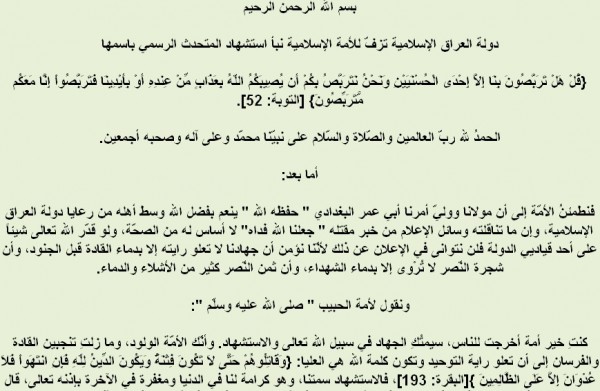 Screenshot of statement apparently issued by the so-called Islamic State of Iraq organization on Thursday, May 3, 2007. Compiled by Iraqslogger, May. 1, 2007 An Iraqi Interior ministry official earlier announced the death of al-Masri, known also as the leader of al-Qa'ida in Iraq, but uncertainties have emerged and the claim is still unconfirmed. In a new development, the Iraqi Interior minister has refused to confirm the claim of Masri's killing, as Iraqi security officials seek to obtain the body of the Egyptian militant. The statement apparently issued by the "Islamic State of Iraq" denying al-Masri's killing, has appeared on Internet forums usually used by the group to carry the group's propaganda under the heading, "Islamic State of Iraq Denies the Killing of the Minister of War (God Protect Him)." The statement bears the hallmarks of previous Islamic State of Iraq communications. The statement, written in Arabic, refers to al-Masri by a nom de guerre by which he is known, Abu Hamza al-Muhajir. It reads, in part: The Islamic State of Iraq reassures the (Islamic) community over the safety of Shaykh Abu Hamza al Muhajir (God protect him), and that he still battles the enemies of God. We point out that the enemy still pretends that there are cracks in the ranks of the Muhahidin in Iraq, but this is beyond their abilities, and will not be, with God's permission. We only offer news of this denial to calm the hearts of the Muslims and as a rebuttal to the craftiness of God's enemies, for whom only papers remain to announce their lies" We say to our family in all places that your brothers in the ministry of war bring you the good news of painful blows that delight the believers and frustrate the unbelievers, Godwilling. God, who sent down the book (revealed the Qur'an), who sets the course of the clouds, and who vanquishes the factions, vanquish the hateful apostates and the Crusaders, who act like Zionists, and those who have allied with them. God, destroy them and make them tremble. The statement continues with further praise to God and supplication for victory against those described as his enemies. Meanwhile, Iraqi Interior Minister Jawad al-Bulani refused on Tuesday to confirm the killing of al-Qaeda in Iraq organization leader Abu Ayoub al-Masri, Voices of Iraq (VOI) reports. Speaking to reporters during a press conference with Iraqi Defence Minister Mohammed Abdul-Qader al-Obeidi, the minister said that information we obtained on the death of al-Masry still uncertain. "But it is a reliable information," he explained, VOI writes. The minister also said that the ministry still tracking down this information to make sure of his death. "The ministry will update media on any news as soon as we obtain it," al-Bulani noted. The Iraqi government is seeking to obtain al-Masri's body, the spokesman for the Iraqi government Ali al-Dabagh and a spokesman for the interior ministry Brigadier Abdul Karim al-Juburi told the official satellite channel al-Iraqiya. "The government is trying to get the body through negotiations with the tribes that have it," Al-al-Dabagh told the state-run channel. Interior Ministry spokesperson Brigadier Abdul Karim Khalaf said earlier that "police forces do not have the body," underlining that the police received information that he was killed from Iraqi tribes and are trying to obtain his body, VOI reports. 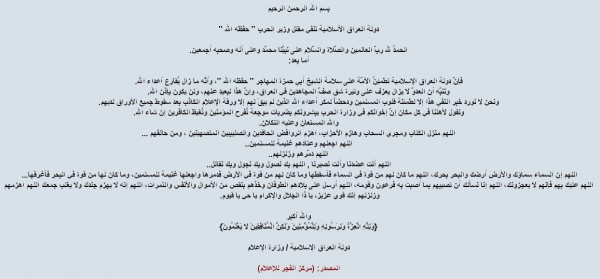 Screenshot of apparent Islamic State of Iraq statement denying the killing of Abu Ayyoub al-Masri, known as Abu Hamza al-Muhajir, as it appeared online Tuesday, May 1, 2007. By Mussab Al-Khairalla and Waleed Ibrahim, Tue May 1, 2007, BAGHDAD (Reuters) - The leader of al Qaeda in Iraq was believed killed north of Baghdad, Iraqi security ministers said on Tuesday, but an al Qaeda-linked group denied the reports and U.S. officials could not confirm the death of Abu Ayyub al-Masri. The U.S. ambassador to Iraq, Ryan Crocker, said that while Masri's death would be "positive," it would not end al Qaeda's violence in Iraq, where it is blamed for trying to tip the country into full-scale sectarian civil war. As violence escalated in Iraq, political tensions over the war, now in its fifth year, reached a fever pitch in Washington. President George W. Bush promised to veto on Tuesday legislation passed by opposition Democrats that will direct him to begin withdrawing U.S. combat troops this year. He was to make a statement at 23:10 p.m. British time. House of Representatives Speaker Nancy Pelosi, a California Democrat, said the measure "respects the wishes of the American people to end the Iraq war." Democrats concede they do not have the votes to override Bush's veto on Wednesday, and Bush has invited congressional leaders to the White House to discuss the next steps. Congress waited to send the bill to Bush until May 1, the fourth anniversary of Bush's prematurely declaring an end to major combat in Iraq as he stood on an aircraft carrier in front of a banner stating "Mission Accomplished." Democrats won a majority in both houses of Congress in the November elections, but they did not gain enough seats to pass without Republican votes legislation opposed by Bush. Bush clearly wants the $100 billion contained in the bill to pay for the wars in Iraq and Afghanistan but refuses to be told by Congress when to withdraw U.S. troops. CONFLICTING ACCOUNTS In Iraq, Interior Minister Jawad al-Bolani said "primary information" showed Masri was dead, telling a news conference that details would soon be released to the media. "Some good news was received about the killing of Abu Ayyub al-Masri ... The reliability of this information is high," Bolani said alongside Defence Minister General Abdel Qader Jassim, who also said Masri was believed killed. Asked again to confirm Masri was dead, Bolani said: "If he has not been killed today, he will be killed tomorrow." The al Qaeda-linked Islamic State in Iraq denied that Masri, also known as Abu Hamza al-Muhajir, had been killed. Iraqi officials have given conflicting accounts of whether Masri was purportedly killed on Tuesday or Monday in a fight between insurgents north of Baghdad. They said his body had not been recovered. There has been growing friction between Sunni Islamist al Qaeda and other Sunni Arab insurgent groups over al Qaeda's indiscriminate killing of civilians and its imposition of an austere brand of Islam in the areas where it holds sway. If he was killed by insurgents, that would signal a deepening split at a time when the Shi'ite-led government is trying to woo some insurgent groups into the political process. In a video-conference call from Baghdad with Washington reporters Crocker, the U.S. ambassador, said al Qaeda had quickly adjusted to the death of Jordanian militant "I would not expect it to in any way bring to an end al Qaeda's activities in Iraq," said Crocker. On the political front, Iraq's main Sunni bloc is considering quitting the Shi'ite-led government because it believes the concerns of Sunnis are not being addressed, members of the bloc including the vice president said on Tuesday. Some members of the Sunni Accordance Front have been urging the bloc for several months to pull out of Shi'ite Prime Minister Nuri al-Maliki's cabinet, partly over accusations that reconciliation with minority Sunni Arabs has moved too slowly. A pullout would not be enough to topple Maliki, as he would still have a majority in parliament through his ruling Shi'ite Alliance and a coalition of Kurdish parties. The Accordance Front has 44 seats in the 275-member parliament. Maliki, a Shi'ite Islamist, insists the government is making progress toward reconciliation between majority Shi'ites and Sunni Arabs who were dominant under Saddam Hussein. (Additional reporting by Ahmed Rasheed in Baghdad, Inal Ersan in Dubai and Sue Pleming and Richard Cowan in Washington) Compiled by Daily Star staff, Nov. 11, 2006 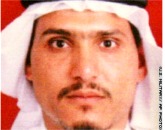 A purported audio recording by the leader of Iraq's Al-Qaeda wing gloated over the resignation of US Defense Secretary Donald Rumsfeld, as a top US general said the military was preparing to recommend strategy changes. Abu Hamza al-Muhajer, also known as Abu Ayyoub al-Masri, said in the recording posted on the Internet Friday that the group had 12,000 armed fighters and 10,000 others waiting to be equipped to fight US troops in Iraq. "I tell the lame duck [US administration] 'do not rush to escape as did your defense minister ... stay on the battle ground,'" he said, adding that the group would not rest until it had blown up the presidential mansion in Washington. "I swear by God we shall not rest from jihad until we ... blow up the filthiest house known as the White House," the voice on the recording said. He appealed to major Iraqi Sunni insurgent groups, notably the Army of Ansar al-Sunna, the Islamic Army of Iraq and the Mujahideen's Army, to endorse the self-styled state and pledge allegiance to its emir. Stung by a thumping defeat in Tuesday's congressional elections, President George W. Bush said Rumsfeld had resigned because there was a need for "fresh perspective" in Iraq. The Pentagon's top general said Friday that US military leaders were preparing to recommend changes in Iraq strategy but Rumsfeld's departure would not have a direct effect. "We have to give ourselves a good honest scrub about what is working and what is not working, what are the impediments to progress and what should we change about the way we are doing it to make sure that we get to the objective that we set for ourselves," General Peter Pace, chairman of the Joint Chiefs of Staff, said on the "Early Show" on CBS television "The change in leadership itself will not have a direct impact on what we do or don't do in Iraq," Pace said. "We continuously review what's going right, what's going wrong, what needs to change." Bush and his national security team will meet Monday with members of a blue-ribbon commission trying to devise a new course for the increasingly unpopular war in Iraq. The bipartisan Iraq Study Group, led by former Secretary of State James A. Baker III and former Democratic Congressman Lee Hamilton of Indiana, is expected to report its recommendations before the end of the year. Earlier in the day, Iraqi soldiers arrested the leader of an Al-Qaeda cell in Anbar Province, Abu Muhayyam al-Masri, a pseudonym meaning, "the Egyptian," a Defense Ministry official said. Two deputy leaders of the cell, Abu Issam al-Libi, or "the Libyan," and Abu Zaid al-Suri, "the Syrian," were also arrested, along with nine other fighters, said the official, speaking on condition of anonymity. The official said Suri confessed to being responsible for organizing at least one suicide bombing in Baghdad. A large quantity of weapons was also seized in the raid, he said. Baghdad was under a regular curfew on Friday to avoid violence on the Muslim day of prayer. Among Friday's Iraqi casualties were six border policemen whose bodies were turned away from the morgue at Kut, 160 kilometers southeast of Baghdad, because of lack of space. Three members of the same family were killed by gunmen who stormed their home at 11:15 a.m. near Baqouba, 60 kilometers northeast of Baghdad. At least 33 bodies, most of them unidentified, were found on Friday in Baghdad, and the cities of Miqdadiyya, Baqouba, Mahmoudiyya, and Kut, morgue officials said. The US military said three soldiers were killed by two separate roadside bombs Thursday. A Marine died of wounds Thursday following combat in Anbar Province, where Sunni rebels are fighting in the west. - Agencies  Amid Violence, New Militant Video Surfaces Amid Violence, New Militant Video SurfacesAPTN (APTN), 15 October 200 An Iraqi militant group that includes al-Qaida in Iraq announced in a video tape that it has established an Islamic Iraqi state. October 13, 2006 A man claiming to be an Iraqi Islamic insurgent has released a video tape urging Osama bin Laden to replace the leader of al-Qaida in Iraq with an Iraqi national. The man, who claimed to be Abu Osama al-Iraqi, said in the 17-minute video tape that there were ?deviations? by al-Qaida in Iraq under its new leader Abu Ayyub al-Masri. ?The group (al-Qaida) in Iraq has deviated ... from your call,? said al-Iraqi, whose image was blurred and his voice deformed to cover his identity. The tape was released on a website commonly used by insurgent groups. The authenticity of the video tape and the man?s identity could not immediately be verified. October 13, 2006 No.1323. Islamist Websites Monitor No. 7 Today, October 13, 2006, an Islamic website posted a 17-minute video cassette showing a masked man called "Abu Osama Al-Iraqi" who presented himself as one of the commanders of the jihad in Iraq. In the cassette, he addressed Osama bin Laden with accusations against Al-Qaeda in Iraq and its commanders, and threatened that the Iraqi mujahideen would fight Al-Qaeda in Iraq. "Abu Osama Al-Iraqi" set out a long list of acts of harassment, murder, expulsion, damage to property, and expropriation of money perpetrated by Al-Qaeda members against the Iraqi mujahideen and their families. He also stated that Al-Qaeda members had expropriated the weapons of the other jihad factions, such as the Islamic Army, and were using the population as a human shield, without consulting with the clerics on this matter. He said that all these actions, including the murder of Iraqi jihad commanders, were aimed at the Iraqi jihad organizations that had refused to join Al-Qaeda or its Shura Council, and that in some Iraqi cities (Ramadi, Falluja, Al-Khalidiya), the Iraqi mujahideen had begun to fight them. As a result of this situation, he said, only the dregs remain in Al-Qaeda in Iraq; all the educated people have left it. The speaker asks bin Laden to replace the amir of the jihad in Iraq and to appoint an Iraqi to this post, as he had appointed an Afghani to head the jihad in Afghanistan. If he did not, Al-Iraqi said, the Iraqi mujahideen would no longer heed him, and would kill and humiliate the members of Al-Qaeda in Iraq. ZeeNews, Oct. 8, 2006 A statement posted today on an Internet website known as a clearing-house for al-Qaeda material denied  recent speculation that the leader of al-Qaeda in Iraq is dead. recent speculation that the leader of al-Qaeda in Iraq is dead. on Al Qaeda boss in Iraq Middle East Times, Dave Clark, AFP, October 5, 2006 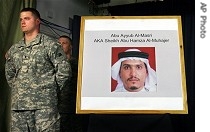 NOT DEAD...YET: Iraq's Al Qaeda leader, Abu Ayyub Al Masri, shown here in an undated photo, has not been killed, say Iraqi and US officials. But one Iraqi security official said they were close to killing or capturing him.
NOT DEAD...YET: Iraq's Al Qaeda leader, Abu Ayyub Al Masri, shown here in an undated photo, has not been killed, say Iraqi and US officials. But one Iraqi security official said they were close to killing or capturing him. BAGHDAD -- US forces said Thursday that they were closing in on Al Qaeda's chief in Iraq, the author of deadly bomb attacks that have provoked a vicious sectarian war, but denied reports that they had already killed him. "We continue to get closer to this guy, and we want to get him," said US spokesman Lieutenant Colonel Barry Johnson after Johnson said that some suspected Al Qaeda militants had been killed this week in a US-led operation in Anbar province, an insurgent hotbed west of Baghdad, but when asked if Masri was among them, said: "No." "The coalition force does not believe that Abu Al Masri, the leader of Al Qaeda in Iraq, has been killed," Johnson said. "During operations in Anbar in the past couple days, intelligence led to an operation targeting an Al Qaeda cell. This raid resulted in several suspected terrorists being killed," he said. "Although it was initially believed Masri may have been among them, our preliminary investigation indicates it is highly unlikely," he said, adding that another Anbar is in the grip of a violent insurgency led by Sunni groups fighting under Al Qaeda's banner and has proved to be one of the most hostile areas of Iraq for US forces and the embattled coalition government. In recent weeks, however, US and Iraqi commanders have been increasingly optimistic that they might be turning the tide in Anbar, after a coalition of powerful tribal sheikhs vowed to hunt down foreign Al Qaeda extremists. There have been several reports of Qaeda fighters being killed by tribal militias, police recruitment is increasing, and Prime Minister Nuri Al Maliki's administration has promised that Masri will soon be caught. National security advisor Muwaffaq Al Rubaie said Sunday that Masri's "days are numbered" after showing the first video images of the Egyptian born militant who replaced former Al Qaeda in Iraq leader On Friday, Masri, also known as Abu Hamza Al Muhajer, broadcast an Internet audio message threatening a renewed offensive and a campaign to kidnap foreigners. He has been described as an Egyptian émigré with an extensive knowledge of explosives. The footage showed a bespectacled man with an Egyptian accent explaining how to a rig a car with bombs. However, despite official optimism in the wake of Zarqawi's death, the number of bomb attacks has not declined. In fact, this week bombings hit their highest levels since the US invasion of 2003. [ ... ] Iraqi and US forces have responded with a joint security plan that has brought 15,000 US troops and more than 40,000 Iraqi soldiers and police on to Baghdad's streets. By Monday, they had "cleared approximately 95,000 buildings, 80 mosques, and 60 muhallas [small administrative districts], detained more than 125 terrorist suspects, [and] seized more than 1,700 weapons," according to the coalition. House-to-house searches have been cut back during the Muslim holy month of Ramadan, however, and Maliki has been reluctant to allow US troops to raid Sadr City, stronghold of the Shiite Mehdi Army militia. US intelligence officers believe that Mehdi militiamen, who are nominally loyal to the radical anti-American cleric Moqtada Al Sadr, are linked to the death squads that hunt political and sectarian targets. Sadr is, however, a powerful figure and his supporters are a key component of Maliki's fragile coalition government. The loyalty of Iraqi security forces has also been in question, with some Shiite-dominated units accused of collaborating with militias and death squads fighting a sectarian war that leaves 100 people dead every day. Iraq Wednesday demobilized an entire 800-strong police brigade and quarantined them in a US military base where they will receive what a US spokesman said was "anti-militia, anti-sectarian, national unity training." 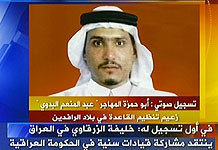 urges killing of US troops Khaleej Times Online, AFP, 8 September 2006 BAGHDAD - Iraq's rival Muslim communities went to their mosques Friday amid fears of new violence after the head of Al Qaeda in Iraq urged the country's Sunni minority to rise up and kill Americans. In an Internet address rebroadcast on satellite television networks, Al Qaeda's chief in Iraq and car bomb expert Abu Hamza Al Muhajer Sunni preachers distanced themselves from the message, but it stirred tensions as violence killed 11 people around the country and the health ministry confirmed that 1,584 people were killed in Baghdad last month. Three of the dead were Shia pilgrims killed by a mortar attack as they headed to the Shia holy city of Karbala for a religious festival. In a video posted on an Islamist website, Muhajer called on supporters of the leaders of the Afghan Taliban and Al Qaeda Islamist networks. "Oh followers of Muhajer, also known as Abu Ayyub al-Masri, has been branded an "expert in vehicle bombs" by the US military and took over as Al Qaeda's head in Iraq after a US air strike killed his predecessor Iraqi and US authorities have accused Al-Qaeda of triggering a bloody Shia-Sunni sectarian war across the country since February, a key factor in the carnage that grips the region around the capital. In response, the Iraq branch of Al Qaeda said Friday it was launching "a new conquest" in line with a request from Muhajer for Sunnis to kill Americans and Shias. "In response to the call of Sheikh Abu Hamza al-Muhajer, the lions of the Mujahedeen Consultative Council have launched a new conquest, in revenge" for Zarqawi's killing, it said in a statement. Earlier, conservative Sunni preacher Sheikh Zakariya al-Tamimi told followers after giving the sermon at west Baghdad's Ibn Taymiyah mosque that Muhajer "speaks only for himself, not all the Sunnis". In his sermon, though, Tamimi railed against an Iraqi government that could not be trusted while Shia militias roamed the streets killing Sunnis, asking the administration "to heal itself". For his part, the Shia cleric Ahmed al-Safi al-Karbalayi said in his sermon at Karbala's Imam Hussein shrine that militias would remain necessary as long as the government could not protect its own people. "Arms should be put in the hands of the state and the state should be able to protect the citizen, otherwise popular organizations shall be formed to defend themselves," he said. At the root of the problem is the continuing sectarian killing between the two communities, especially in mixed areas like Diyala, Baghdad and Babil provinces where sectarian killings are an almost daily occurrence. The health ministry said the Baghdad mortuary received 1,584 bodies of people killed in violent attacks in August, a 14 percent decrease from the 1,850 killings it reported in the capital in July. The figures fly in the face of Thursday's statement by the US forces' chief spokesman Major General William Caldwell that August's "murder rate in Baghdad dropped 52 percent from the daily rate for July." However, another coalition spokesman said on Friday that the US military figure for murders does not include those killed in Baghdad's daily toll of suicide bombings and mortar attacks on crowded civilian areas. Even as the security push Many in the formerly dominant Sunni Arab minority fiercely oppose such a regional decentralization of Iraq, fearing it will leave them with only barren parts of central Iraq and the vast desert of western Anbar province. Prime Minister Nuri Al Maliki on Thursday signed an accord with General George Casey, head of coalition forces in Iraq, to begin to take charge of Iraq's armed forces which hitherto reported to Casey. The accord brought Iraq's tiny air force and navy and one of its 10 army divisions under Maliki's command. |
by Mark Hosenball, Newsweek, June 26, 2006 issue The death of Abu Mussab al-Zarqawi is unlikely to have put much of a dent in the ranks of Iraq's insurgents. According to two U.S. counterterror officials, who asked for anonymity due to the sensitive subject matter, at least seven Islamic extremist groups besides Zarqawi's Al Qaeda in Iraq are believed to be members of the Mujahedin Shura Council, an umbrella organization set up to coordinate activities among religiously motivated insurgent factions. The council's members include such little-known gangs as the Victorious Sect Army (reportedly active in northern Baghdad), the Monotheism Supporters Brigade (operates north of Baghdad), Al-Ahwal [Fear] Brigade (in the Haditha area) and Al-Murabitun Brigades (announced as a new council member in March). The officials say U.S. agencies are aware of at least four other Iraqi Islamist terror groups—Ansar-al-Sunnah, the Islamic Army of Iraq, the Mujahedin Army and the 1929 Revolutionary Brigade—outside the Shura Council. And all these Islamist groups together are only a fraction of the larger insurgency, dominated by former Saddam loyalists and a Baath underground linked to Saddam's intel apparatus. Evan Kohlmann, a private researcher who follows Iraqi insurgents' Web postings, says that in the weeks before Zarqawi's fall some of these groups announced that their own leaders had been killed in action. Yet those deaths haven't slowed the groups' attacks. Experts also question the military's ID'ing of Zarqawi's successor. At a Baghdad press conference, Bill Caldwell, a U.S. military spokesman, reported that Zarqawi's replacement was Abu Ayyub al-Masri, an Egyptian whose real name is Youssef al-Dardiri, a former fighter in Afghanistan and an associate of bin Laden deputy Ayman al-Zawahiri. Caldwell also asserted that al-Masri/Dardiri was the same person as Abu Hamza al-Muhajer, the name given in communiqués from Zarqawi's group for their late leader's replacement. But the two counterterror officials who spoke to Newsweek were not certain of that ID. Kohlmann says it's "unlikely" the Egyptian has taken Zarqawi's place, and national-security adviser Stephen Hadley told a White House briefing that "it's not clear at this point" who has replaced Zarqawi. | ||
already an enigma Military, intelligence officials differ on identity of new leader June 14, 2006 Washington (CNN) -- A week after the death of Abu Musab al-Zarqawi, U.S. military and intelligence don't have a concrete answer as to who his successor is -- or if he even exists. On Monday, five days after al Qaeda in Iraq leader al-Zarqawi was killed in a U.S. airstrike in Baquba, statements were published on Islamist Web sites naming Abu Hamza al-Muhajer as the group's new leader. The Pentagon on Wednesday identified al-Muhajer as an Egyptian-born terrorist who trained in Afghanistan, but U.S. counterterrorism officials questioned whether there is such a person. Analysts suggested that al-Muhajer, a name that means "the immigrant" in Arabic, was a foreigner like the Jordanian-born al-Zarqawi. On Tuesday a statement attributed to al-Muhajer threatened attacks against U.S. forces and Iraqi government officials in Baghdad's Green Zone, the fortified compound that houses the Iraqi government headquarters, embassies and a U.S. military base. In the Web posting, al-Muhajer also pledged allegiance to al Qaeda leader Osama bin Laden, saying: "All of us are under your banner. With God's permission, victory is near." U.S. military officials say they're convinced al-Muhajer is actually Abu Ayyub al-Masri, an Egyptian associate of al-Zarqawi. No reason was given for the assumption, but military officials have said that they confiscated a "treasure trove" of intelligence on al Qaeda in Iraq, including computers and information from captured insurgents, the night before and during the attack on al-Zarqawi. Al-Masri and al-Zarqawi met at the al-Farouk training camp in Afghanistan in 2001 or 2002, said Maj. Gen. Bill Caldwell, a U.S. military spokesman in Baghdad. On Thursday, Caldwell told reporters that al-Masri was a likely candidate to succeed al-Zarqawi. "Probably Abu al-Masri, if you had to pick somebody, would be the person that is going to try to occupy the position that Zarqawi had," Caldwell said. He added that al-Masri has been the subject of "intense focus" by U.S. commanders since the airstrike on al-Zarqawi. "We know that before al-Zarqawi's death, he used Ayyub al-Masri as his sort of second man in terms of running operations here in Iraq," Caldwell said. In briefings Friday, Caldwell said al-Masri "came to Iraq before Zarqawi did, probably located somewhere around the Baghdad area sometime in around 2003, established probably the first al Qaeda in Iraq cell here in the Baghdad area, and that they continued a very close relationship since that time." Al-Masri also has had communications with bin Laden's top lieutenant, Ayman al-Zawahiri, Caldwell told reporters, adding that "anything beyond that would be in operational channels and probably not something we should talk about." Al-Masri also has been involved with making roadside bombs in Iraq, Caldwell said. However, U.S. counterterrorism officials say they aren't sure "Abu Hamza al-Muhajer" is al-Masri. He could be someone else, or al Qaeda in Iraq could be using a "placeholder name" while it decides on a new leader, one official said. Saudi security officials also have been unable to identify al-Muhajer, and they say they have never heard his name before. He could be hiding his real name even from fellow militants, the Saudi security officials said. Iraqi troops say they have not heard of him, either. U.S. military officials say they're debating whether to disseminate more information about al-Masri because they are concerned it could help create another terrorist icon like al-Zarqawi. U.S. intelligence has enough information on al-Masri to recognize him, Brig. Gen. Carter Ham told reporters at the Pentagon, but he would not say if the military has photographs of him. Intelligence officials will evaluate whether al-Masri "is, in fact, exercising the leadership role," Ham said. "It's not unlikely that there may be some reluctance of individuals to step forward because of some of the successes that the Iraqi and U.S. and other coalition forces have had against that organization. "Those individuals operate at some individual peril," the general said. | al-Baghdadi audiotape Aljazeera, 17 June 2006 In an audiotape broadcast by Aljazeera, a purportedly major figure in the Iraqi uprising has said the killing Abu Musab al-Zarqawi, the leader of al-Qaeda in Iraq, will strengthen fighters' determination. Abu Abdullah Rashid al-Baghdadi, the head of the Mujahidin Shura Council - which consists of five anti-US and anti-government groups including al-Qaeda in Iraq - described al-Zarqawi's death as a "great loss". The tape aired on Friday appears to be an attempt to rally support for the Sunni fighters. "This is a message to the enemies of God, the Crusaders, the rejectionists and the renegades," the voice says, referring to the US-led forces, the Shias, and the Sunnis in the Iraqi government. "The martyrdom of the leader [al-Zarqawi] will not change the arena of confrontation. Rather, it will become fiercer and stronger," Abu Abdullah Rashid al-Baghdadi says. Al-Zarqawi was killed when by a US air strike on the house in Baquba where he was meeting his advisers on June 7. "This leader [al-Zarqawi] has laid the foundations and his great loss will not lead to weakness. He will remain a symbol for all the mujahideen, who will take strength from his steadfastness," he says. Abu Abdullah Rashid al-Baghdadi is believed to be a former officer in Saddam's army, or its elite Republican Guard, who worked with al-Zarqawi after the overthrow of the Iraqi president in April 2003. Some terror experts mentioned al-Baghdadi as the possible successor to al-Zarqawi, but the US military believe al-Qaeda in Iraq is now led by Abu Ayyub al-Masri, an Egyptian-born fighter who trained with al-Zarqawi in Afghanistan. Al-Qaeda in Iraq has identified its new leader as Abu Hamza al-Muhajer. Multinational and Iraqi forces have carried out a number of raids targeting anti-government Sunni fighters since al-Zarqawi's death. The US military says 104 fighters have been killed and 28 significant arms caches discovered. On Friday, Muntasir al-Zayyat, an expert on Islamist groups, told Aljazeera that the purported new leader of al-Qaeda in Iraq whose picture 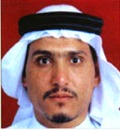 was published by the US forces in Iraq, is actually Yusif al-Dardiri, an Egyptian in his mid-30s from the southern Egyptian city of Sohaj.
was published by the US forces in Iraq, is actually Yusif al-Dardiri, an Egyptian in his mid-30s from the southern Egyptian city of Sohaj.Al-Dardiri's family moved to Cairo while he left Egypt in the late 1980s for another Arab country, al-Zayyat said. al-Zarqawi's successor June 15, 2006 Baghdad, Iraq - The U.S. military said Thursday the man claiming to be the new al-Qaida in Iraq leader is Abu Ayyub al-Masri, an Egyptian with ties to Osama bin Laden's deputy, Ayman al-Zawahri. Maj. Gen. William Caldwell, a U.S. military spokesman in Baghdad, said al-Masri apparently is the same person that al-Qaida in Iraq identified in a Web posting last week as its new leader - Abu Hamza al-Muhajer, a nom de guerre. Al-Muhajer claimed to have succeeded Abu Musab al-Zarqawi, who was killed in a June 7 U.S. airstrike, and vowed to avenge him in threatening Web statements in recent days. The military showed a picture of al-Masri wearing a traditional white Arab headdress at a Baghdad news conference. The Afghanistan-trained explosives expert is a key figure in the al-Qaida in Iraq network with responsibility for facilitating the movement of foreign fighters from Syria into Baghdad, Caldwell said. He has been a terrorist since 1982, "beginning with his involvement in the Egyptian Islamic Jihad, which was led by al-Zawahri," Caldwell said. The spokesman added that raids in April and May in southern Baghdad recovered material confirming his high-level involvement in the facilitation of foreign fighters. "Al-Masri's intimate knowledge of al-Qaida in Iraq and his close relationship with (al-Zarqawi's) operations will undoubtedly help facilitate and enable them to regain some momentum if, in fact, he is the one that assumes the leadership role," Caldwell said. He said, however, that al-Masri's ability to exert leadership over al-Qaida cells remained unclear and there were other "al-Qaida senior leadership members and Sunni terrorists" who might try to take over the operations. Caldwell singled out Abu Abdul-Rahman al-Iraqi, who in the past had been identified as al-Qaida in Iraq's deputy leader in statements by the group, and Abu Abdullah Rashid al-Baghdadi, the leader of the Mujahedeen Shura Council - five allied groups in the Sunni Arab-dominated insurgency. | |
|
Government of Canada, Office of Superintendent of Financial Institutions, April 26, 2006 Consolidated List of Names subject to the Regulations Establishing a List of Entities made under subsection 83.05(1) of the Criminal Code or the United Nations Suppression of Terrorism Regulations. Take a look at (ID #3, 297.03) certain Al-Muhajer born 30/10/66 in Al-Zarqaa, Jordan (!). Another one, (ID #3, 54.03) Al-Muhajir Abdul Rahman was born in 19/06/64 Dakahliya, Egypt. al-Muhajer (al-Muhajir) or associated with the Taliban Last updated on 25 April 2006 Interestingly, according to this UN list updated 25. April 2006, same person had both pseudonyms: (a) Abu Musab Al-Zarqawi and (c) Al-Muhajer: ● 56. *Name: 1: AHMAD 2: FADIL 3: NAZAL 4: AL-KHALAYLEH Title: na Designation: na DOB: 30 Oct. 1966 POB: Al-Zarqaa, Jordan *Good quality a.k.a.: a) Abu Musab Al-Zarqawi b) Muhannad c) Al-Muhajer d) Garib Low quality a.k.a.: na *Nationality: na Passport no.: na National identification no.: na Address: Whereabouts currently unknown *Listed on: 23 Sept. 2003 *Other information: na ● 79. *Name: 1: MUHSIN 2: MOUSSA 3: MATWALLI 4: ATWAH DEWEDAR Title: na Designation: na DOB: 19 June 1964 POB: Dakahliya, Egypt *Good quality a.k.a.: a) Al-Muhajir, Abdul Rahman b) Al-Namer, Mohammed K.A. Low quality a.k.a.: a) Abdel Rahman b) Abdul Rahman *Nationality: Egypt Passport no.: na National identification no.: na Address: na *Listed on: 17 Oct. 2001 (amended on 26 Nov. 2004) *Other information: Afghanistan. |
By Brian Bennet and Hussein Hamdi, Time, June 12, 2006 Several Islamic militant websites Monday announced Abu Mousab al-Zarqawi's successor at the head of Al-Qaeda in Iraq. One site, called Without Borders, said the new leader, Abu Hamza al-Muhajer, is an "experienced fighter." The name was not immediately known and could be a new pseudonym. "Mujaher" means "immigrant," which could indicate that the new chief for Zarqawi's organization is, like Zarqawi himself, from outside of Iraq. Day 8, Feb. 21, 2001 Abu Rahman al Muhajer was mentioned in the Transcript of the trial of suspected al-Qaida militants in connection with the bombings of the American embassies in Kenya and Tanzania on 7 August 1998. By Phil Smucker, Time, Feb. 01, 2004 A video gives new insight into the methods and motivations of suicide attackers in Iraq On the CD each alleged bomber makes a statement announcing his intention, but without naming the specific target. Abu Thabet al-Muhajer believed to have carried out an attack last December 9th in Ninevah province, vows to continue the struggle against the Americans "until Palestine is free" and "as long as our brothers are suffering inside the jails of the tyrants." On Bin Laden's European Network By Leo Sisti and Maud Beelman, Oct. 3, 2001 Late last year, U.S. intelligence told Italian authorities that a man using the alias, Umar al-Muhajer, was "joining a group of three Islamic extremists who were linked to the Osama Bin Laden organization and, from Afghanistan, were planning vague actions against American targets in Italy," the Italian report said. U.S. intelligence also provided Italian authorities with a cell phone number which, along with the alias, was later traced to Ben Khemais, according to the report. |
 Al Qaeda in Iraq Newsfeed
Al Qaeda in Iraq Newsfeed